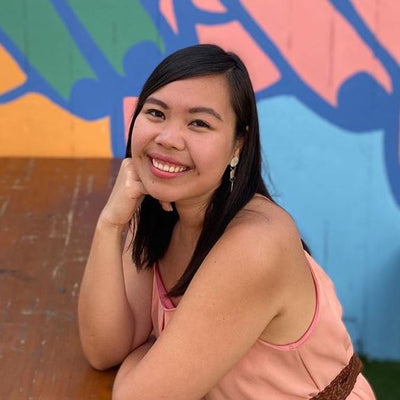Jérôme and I heard that the night’s feature guest was no other than Tony Meloto, founder of the world-reknowned Gawad Kalinga and winner of the 2012 Social Entrepreneur of the World award. We’ve been following his work for the past two years and jumped at the chance to see the man who created “the Silicon Valley of social enterprises”. So, we trekked down to Manila from my parents’ home in Malolos and got our fair share of Manila traffic but it was well worth every minute.

Tony Meloto speaking at the Nailed It! Night in Makati
“What’s your dream for your farm?” I asked her. She had such a glimmer in her eye as she spoke. The average age of a farmer in Philippines is 60, which is dreadful for the future of agriculture in the Philippines. She wants her farm to bridge the gap between young people and agriculture – to become a site where people can learn about farming, healthy eating, and be able to touch, feel and smell the fruits and vegetables that come from their country. It’s quite a lovely dream.
I also met Mark, a Filipino American social entrepreneur, who founded Minka. Minka is a social enterprise driving the toothbrush movement, a move towards using biodegradable and natural toothbrushes made of bamboo instead of harmful plastic. They donate 10% of every toothbrush purchase to Habitat For Humanity in the Philippines and are in the process of launching several new bamboo-based products. That night, we also met a Ukrainian HR consultant working in Philippines, a Filipina American working in a company that provides graphic design services for social enterprises, and several young Filipinos working in non-profits.

Me (Gelaine) admiring the Bambike, a socially responsible bamboo-made bike that is proudly made in the Philippines
All the accomplishments he spoke about were impressive, but I was most impacted by the simple way he spoke. “We have no excuse to be poor” he said frankly. The Philippines is a rich country with mountains and lush valleys, bountiful land, and intelligent people. It’s scandalous, he said, that the Philippines is capable of producing its own chocolate and coffee, but instead we import it from countries that don’t even grow coffee or cocoa trees.
“The biggest critics of the Philippines are Filipinos themselves,” he said. “When foreigners come here, they love the Philippines. So, we must bring in bright foreigners so they can teach Filipinos how to love their own country.”

It’s so true. Jérôme and I have close friends who have travelled across the Philippines on their own and one who currently lives in Manila – they’ve all loved their experience and the people. On the other hand, when we told my parents that we were going to Makati for one night in order to attend this event, we were bombarded with warnings from aunts and uncles and grandmothers about how we need to be careful, the Philippines is dangerous, Filipinos can’t be trusted, blah blah etc. They event wanted to send a chaperone to stay with us for the night!
I also recalled with frustration the number of times relatives would ask my parents to send things to Philippines – requests ranging from perfume to chocolates to playing cards and backpacks. “Why can’t we just send them money to buy it in Philippines? At least we can help the local economy?” I asked. “Because it’s better here in Canada” was always the response.
Somehow, people are taught from birth that “Filipino-made” is to be inferior, and that to be Filipino is to be second class. Things need to change. There’s no way the Philippines can become a strong country when Filipinos live in fear of other Filipinos or believe their own products (and consequently, their own people) are inferior.
And I think things are changing (albeit slowly). That night, I looked around the room and saw Filipinos and non-Filipinos alike shaking hands and sharing ideas. As they spoke, I saw the gleam of excitement in their eyes and the flash of recognition that would pass between them: you get it. You understand. You want to do something and it’s going to be big.
It’s lonely to be a social entrepreneur, but that night, I felt very far from lonely.
Gelaine Santiago

Gelaine is a social entrepreneur, an online storyteller, and a passionate advocate for diversity and ethics in business. She’s the co-founder of Cambio & Co., an e-commerce fashion company working with Filipino artisans to celebrate Filipino craftsmanship, culture, and heritage. Gelaine is also one of the founders of Sinta & Co., the world’s first conscious Filipino wedding boutique. She was named one of RBC’s Top 25 Canadian Immigrants of 2019. Find her on Instagram @gelainesantiago and www.gelainesantiago.co



Leave a comment